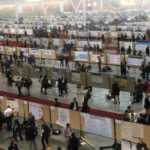- ACR Basic Science Symposium: The Revolution of Epigenetics in Autoimmunity (Monday, November 8; 4:30–6:00 pm)
- ACR Immunology Updates for the Clinicians: Epigenetics 101 (Wednesday, November 10; 8:45–9:45 am)
Ready, Aim, Get Funded!
The ARHP Research Committee will hold a workshop called “Ready, Aim, Get Funded!” at the ACR/ARHP Annual Scientific Meeting in Atlanta on Wednesday, November 10. Specific aims are one of the most important pieces of the grant application, but often they are the most difficult to write. This workshop will teach a hands-on approach to writing strong specific aims, including examples of good and bad specific aims. Participants must bring a one-page draft of specific aims for an actual grant proposal for review and to get one-on-one expert feedback. Space is limited so register early at www.rheumatology.org/education.
Stem Cell Therapies
Stem cell therapies may be one approach to correct epigenetic changes in patients with chronic inflammation or fibrosis. Remarkably, such therapies have recently become very practical, and trials in rheumatic diseases are now underway. The two sessions that will provide a succinct update on stem cell therapies are:
- ACR State-of-the-Art Lecture: Stem Cell Reprogramming: Molecular Mechanisms and Clinical Applications and Implications (Wednesday, November 10; 10:45–11:45 am)
- ACR Immunology Updates for the Clinicians: Therapeutic Use of Mesenchymal Stem Cells in Rheumatologic Diseases (Thursday, November 11; 7:30–8:30 am)
B Cells
B cells, anti-CD20, and anti-BAFF monoclonal antibodies have been shown to be effective for autoimmune disease, but how these therapies actually work is not at all clear. Thus, the roles B cells play in immunity need to be re-examined. At this year’s meeting, these two sessions will shed some light on this important area of research and help facilitate additional discussion:
- ACR State-of-the-Art Lecture: Toll-Like Receptors Activation of B cells in Autoimmune Disease (Monday, November 8; 7:30–8:30 am)
- ACR Basic Science Symposium: B Cell Effectors and Regulators (Wednesday, November 10; 2:30–4:00 pm)
Autoimmune Disease Prevention
Patients who develop systemic lupus erythematosus, RA, or other autoimmune diseases such as type I diabetes have a long period of asymptomatic autoimmunity. Researchers in other specialties have performed clinical trials attempting to prevent the transition from asymptomatic autoimmunity to autoimmune disease. We are now beginning to see similar attempts in rheumatology. This year, two basic science symposia are dedicated to this topic:
- ACR Basic Science Symposium: The Biology of Citrullination (Tuesday, November 9; 2:30–4:00 pm)
- ACR Basic Science Symposium: The Preclinical Stage of Rheumatoid Arthritis: Towards Prevention of Disease? (Tuesday, November 9; 4:30–6:00 pm)
The 2010 ACR/ARHP Annual Scientific Meeting will be held November 6–11 in Atlanta. For more information on this year’s basic research offerings, visit www.rheumatology.org/education.
